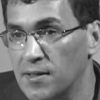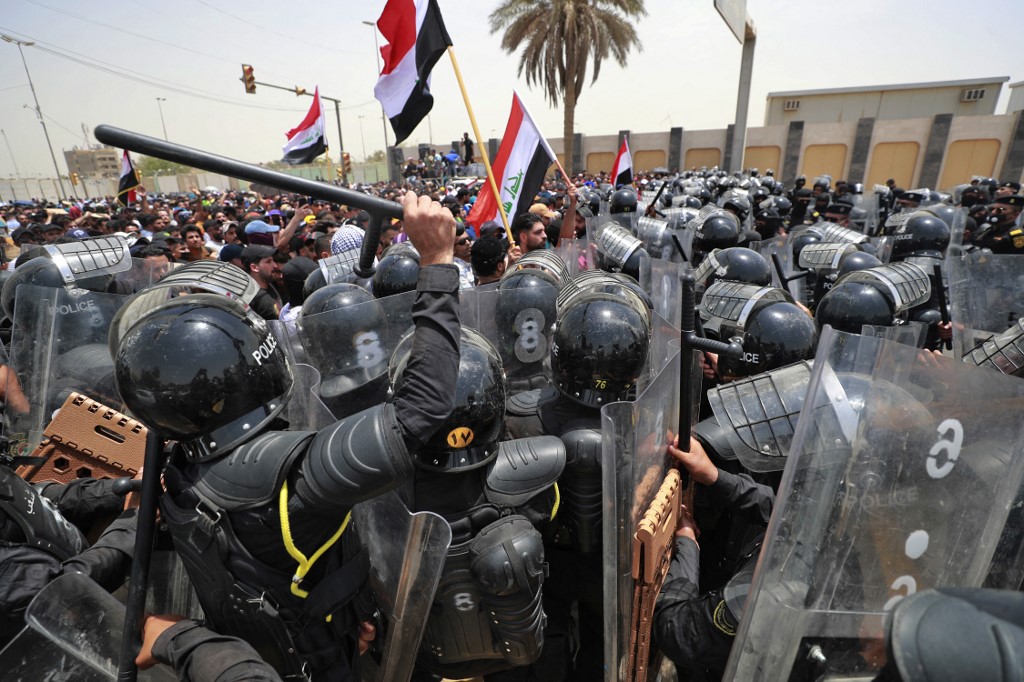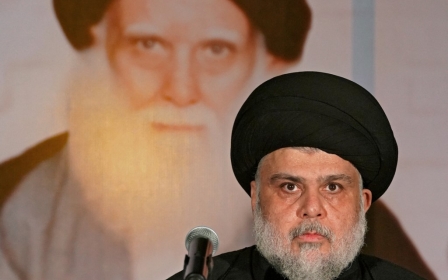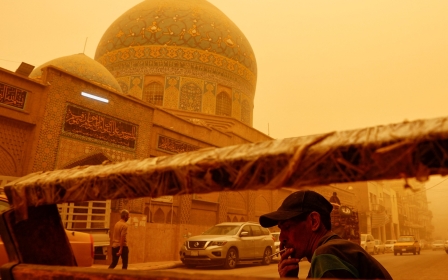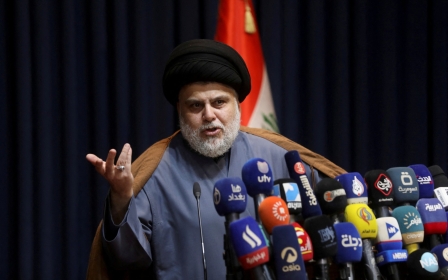Iraq: Once again, Muqtada al-Sadr stirs up the entire political system
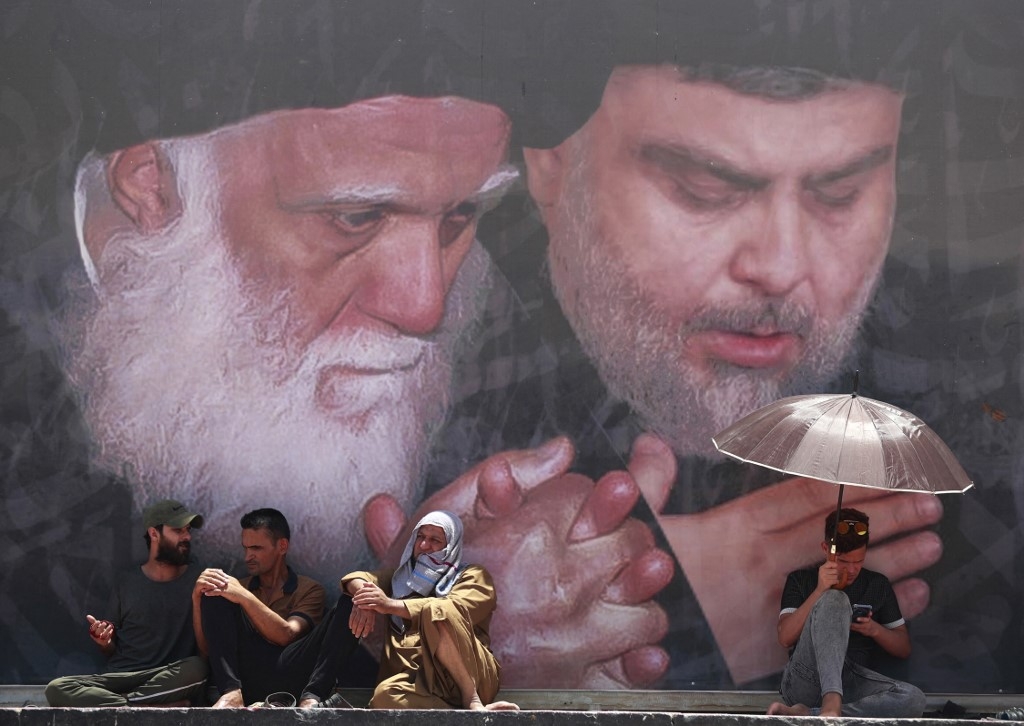
The recent resignations of the Sadrist bloc’s parliamentarians from the Iraqi parliament at the order of their political leader, Shia leader Muqtada al-Sadr, took everybody by surprise.
Relinquishing the institutional power that comes with being the biggest parliamentary bloc with 74 seats, and leading a majority alliance of approximately 182 seats that still has a reasonable chance to form the next government, seems foolish at worst and a high-stakes risk at best.
New MEE newsletter: Jerusalem Dispatch
Sign up to get the latest insights and analysis on Israel-Palestine, alongside Turkey Unpacked and other MEE newsletters
A closer look may reveal that a well-calculated strategy is underway and that surprise is just one element of it. The Sadrist rival, the mostly pro-Iran Coordination Framework, received the unexpected gift of dozens of replacement parliamentary seats to fill the spots left by the Sadrists.
This gives the Coordination Framework somewhere between 120 and 130 seats, enough to lead the government-formation process and start the usual difficult fight over the spoils. The Framework’s many internal conflicts, overlooked during its six-month confrontation with Sadrists, will make it very hard for it to form a government without significant Iranian intervention.
This would be needed to impose discipline within the political bloc and coerce reluctant Sunnis and Kurds, demonised by the factions for their previous alliance with Sadr, to join another fragile national unity government predicted not to last long with the Sadrists out.
An Iranian initiative
Iran’s next move could be decisive here. It well knows that a Shia-dominated government without the Sadrists spells trouble for it and a possible repeat of street protests, at a much larger scale than the demonstrations of 2019 and 2020. Then, Iran’s influence and its Iraqi allies in the Framework, both openly challenged by the Sadrists in recent months, became the target of the protesters.
Iran’s anger at Sadr following the parliamentary resignations is evident, with Iranian media outlets close to the regime attacking Sadr as 'the breaker of unity'
Iran’s anger at Sadr following the parliamentary resignations is evident, with Iranian media outlets close to Tehran attacking Sadr as “the breaker of unity”.
Insiders have told Middle East Eye that Shia politicians are expecting an Iranian initiative to “solve the crisis” and to help keep the Sadrists within institutional politics and away from street politics. This would effectively mean accepting Sadr’s demand for a Sadrist majority-led government.
According to these insiders, Iran had previously accepted this Sadrist proposal but had demanded guarantees to guard against dismantling the pro-Iran militias and pursuing anti-corruption efforts that undermine the Framework’s players, particularly former Prime Minister Nouri al-Maliki.
Sadr refused to give such guarantees. Now, with the Sadrist move to leave parliament, Iran may have to reconsider its position to accommodate Sadr and accept the loss of some allies in a bid to avoid bigger losses later on.
This is where the importance of timing comes in. Sadr strategically made his move at the end of the first four-month parliamentary session, before a month-long recess. Although the parliament speaker, Mohammed al-Halbousi, formally accepted the Sadrist resignations to make them official and final - at the request of Sadr himself - they are not irreversible.
In search of a deal
In the opaque ways of Iraqi politics, deals count more than the letter of the law. These resignations become irreversible only when the replacement parliamentarians - the second vote-winners - are sworn in. This will not happen before the new parliamentary session begins on 9 July.
If the swearing-ins are scheduled later, this allows even more time for deal-making.
The appearance of legality and finality Sadr insisted on is part of the pressure for a deal to accommodate Sadrist demands. Iran and the Framework have enough time to work on this deal if they want to avoid facing a more difficult choice later.
If this deal does not pan out, the Framework will have to lead efforts to form a new national unity government - a very difficult task this time.
The Framework’s biggest weaknesses will stand in its way: its members' inability to work together and the short-sighted ways that led it to damage its relations with potential ethno-sectarian allies - the Kurdish and Sunni parties that allied themselves with Sadr.
Framework politicians routinely accused these parties of dealing with Israel and sowing discord among Shias. The armed wing of the Framework even bombed Erbil, the Kurdish regional capital, and the headquarters of Sunni parties. Forming a national unity government would require the participation of these parties.
What may complicate the government-formation process is the “disabling third", the two-third quorum requirement to elect the president of the republic. These parties can use it to prevent a government from forming and force the Framework into difficult concessions.
This would mean the absence of 109 MPs from the presidential election’s parliamentary session, a target not hard to reach. The Framework used the disabling third as a blackmail tool against the tripartite Sadrist-led alliance.
It will likely be used against it this time.
The last resort
The Sadrists’ final choice, if Iran and the Framework do not grant their demands, is using the street to force the two into accepting what they had refused through parliament.
If the Sadrists manage to mend fences with the protest movement they once targeted with a smear campaign and armed attacks, killing dozens of protesters, they can create a formidable force on the streets, capitalising on people’s rising anger at the failed political class, led now by the Framework.
If the Sadrists manage to mend fences with the protest movement they once targeted, they can create a formidable force on the streets
This potentially powerful alliance, a reachable goal for the Sadrists, is the best bet for both sides - the October protesters and the Sadrists - to unseat the current political class.
If the Framework succeeds in putting together a new government, it would likely be weak and dysfunctional, repeating the usual failures of previous national unity governments, with poor public services, lack of economic opportunity, more corruption, and no accountability.
Under such a government, with organised street opposition this time, it would only take a suitable spark to start protests to force the new government out.
But the Sadrists’ biggest problem may be at the “moment of victory”. Most non-Sadrist protesters want to overthrow the entire political system, while the Sadrist goal is to get rid of Shia political rivals through another early election with a bigger Sadrist win and a sure shot at a Sadrist-dominated government.
In the end, the Sadrists' greatest challenge may not be the Coordination Framework, but controlling the formidable forces they help unleash.
The views expressed in this article belong to the author and do not necessarily reflect the editorial policy of Middle East Eye.
This article is available in French on Middle East Eye French edition.
Middle East Eye delivers independent and unrivalled coverage and analysis of the Middle East, North Africa and beyond. To learn more about republishing this content and the associated fees, please fill out this form. More about MEE can be found here.


